F Scott Fitzgerald's ledger, a detailed chronicle of both his earnings and his life, has been made available online for the first time, giving readers around the world an insight into the daily grind of the Great Gatsby author.
Described as "one of the richest primary-source documents in existence for any literary author" by the University of South Carolina, which put the papers online, the ledger includes Fitzgerald's spreadsheets tracking the money he made from 1919 through to 1937 – including an advance of $3,939 for The Great Gatsby in 1923 – as well as an "outline chart" of his life.
Starting sparsely, and laconically, the biographical outline sees Fitzgerald note his birth on 24 September 1896, his first laugh the next February, and his first word that July: "It was the monasyllable [sic] 'up'". At the age of one, he writes, he caught bronchitis, and "a specialist was summoned but as his advice was not followed the child pulled through"; at two, "he put on bloomers and went to Washington"; at three, he "celebrated the new century by swallowing a penny and catching the measles. He got rid of both of them." Later, he was sent to school by his parents, "but he wept and wailed so they took him out again after one morning".
At six, "he entered Miss Goodyear's school and he and another little girl, name unknown, worked out the phonetic spelling of C-A-T. Thus becoming the stars of the primary class." At seven, "he had a birthday party to which no one came", and "moved to Buffalo, New York, possibly in consequence". At 11, "he went to Confession about this time and hid by saying in a shocked voice to the priest, 'Oh no, I never tell a lie.'"
As Fitzgerald gets older, his entries start to become more detailed. His 19th year was one "of terrible disappointments & the end of all college dreams. Everything bad in it was my own fault", but by 22, he was living "the most important year of life. Every emotion and my life work decided. Miserable and ecstatic but a great success." His September 1918 entry reads: "Fell in love on the 7th … Quarrel. Silence. Zelda sick … Discovery that Zelda's class voted her prettiest & most attractive." In 1920, his first novel This Side of Paradise was published, and Zelda Sayre agreed to marry him.
The overview ends in 1934/5, when Fitzgerald turned 38. He would die in 1940. "Debt bad," he writes. "Borrowing more from mother." Then: "Wrote story about Peacocks. Very Sick. Debts terrible … Went on wagon for all liquor & alcohol on Thursday 7th (or Wed. 6th at 8.30 P.M)." It ends with a March entry: "Zelda very bad on return. Terrible worry …"
The ledger is held in the rare books department at the University of South Carolina. "This is a record of everything Fitzgerald wrote, and what he did with it, in his own hand," director Elizabeth Sudduth told the Associated Press.
"We know he didn't spell very well. And his arithmetic wasn't much better," she said, but given his reputation as an alcoholic, the document shows Fitzgerald "was far more on top of his affairs than people thought". "He was keeping a record of his work for the future. He kept it, he updated it," she said.

Comments (…)
Sign in or create your Guardian account to join the discussion